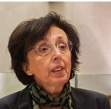

Giulia Galli

Liew Family Professor of Electronic Structure and Simulations, Pritzker School of Molecular Engineering and Department of Chemistry, University of Chicago; Senior Scientist, Argonne National Laboratory
Email:gagalli@uchicago.edu
WWW: external link
Member of the United States National Academy of Sciences, the American Academy of Arts and Science, Fellow of the American Physical Society and of the American Association for the Advancement of Science. Awards include the Materials Research Society Theory Award, the American Physical Society David Adler Award in Materials Physics, the Feynman Nanotechnology Prize in Theory, the Medal of the Schola Physica Romana and the Tomassoni-Chisesi Award by La Sapienza University, Italy and the US Department of Energy Award of Excellence.
Author of:
More than 350 papers in physical and theoretical chemistry, condensed matter physics, and materials scienceImportant Contributions:
- The invention of novel theoretical and computational methods to investigate and engineer, from first principles, the properties of heterogenous, complex systems at the microscopic scale, including linear scaling (O(N)) algorithms for electronic structure calculations based on Density Functional Theory (DFT), enhancement of First Principles Molecular Dynamics (FPMD) for the prediction of spectroscopic properties of liquids and amorphous systems, and a novel formulation of many body perturbation theory.
- The prediction of new properties of liquids, solids and nanostructures, from first principles theories and computation, including predictions of the phase diagrams of elements and of simple molecular systems, the study of the properties of liquid water at ambient conditions and under pressure, and the identification of the key influence of surface chemistry and morphology on the functionalities of nanoparticles.
- The prediction of structural and electronic properties of surfaces and interfaces present in photoelectrochemical cells and the development of a fully first principles strategy, integrated with experiments, to predict the properties of spin-qubits in semiconductors.